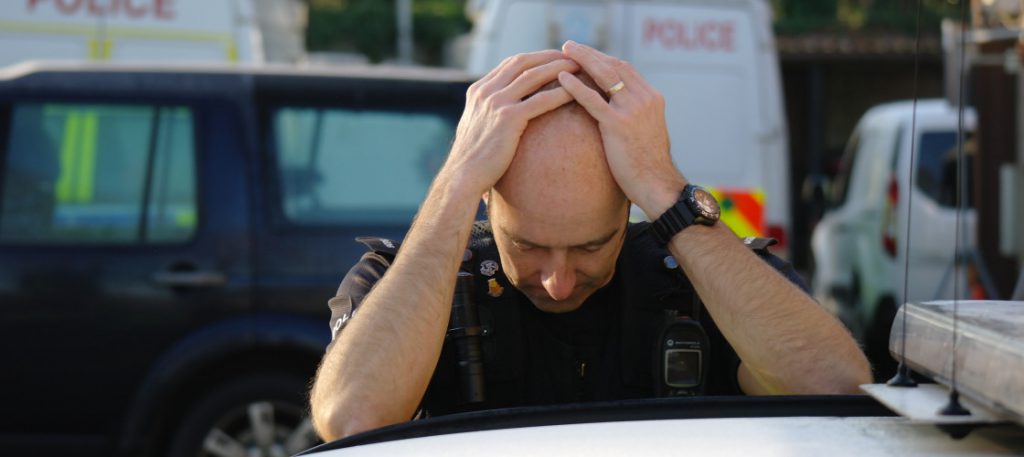
The Impact of Work-Related Stress on Law Enforcement Personnel
A Conversation with MCOHS PhD Student Teddy Nam

In 2020, MCOHS PhD student Teddy Nam was awarded a grant through the MCOHS-ERC Pilot Projects Research Training Program for a collaborative research study to address work-related stress on law enforcement personnel, specifically in response to the COVID-19 pandemic and the George Floyd incident in Minneapolis.
Our web coordinator reached out to Teddy to learn more about this timely and impactful research project, what was learned, and the resulting outcomes for occupational health and safety, equity, and public health.
Read on to learn more about Teddy’s work…
Q: What led you to the development of this study?
This research study started with a simple question in the Twin Cities Boys and Girls Club parking lot, “what is your research interest?” This question sparked a brief conversation with a local police officer that quickly turned into collaborative partnership between the Midwest Center for Occupational Health and Safety (MCOHS) Education and Research Center and two-law enforcement agencies here in the Twin Cities metro area. The objective of both agencies was to improve the health and wellness of all law enforcement personnel by addressing work-related stress against the backdrop of COVID-19 and the George Floyd incident.
The George Floyd incident and the Black Lives Matter movement have energized us to finally fight systematic racism and police-involved injustices. This study, we hope, contributes to this greater cause in a unique and fundamental way – by understanding the stressors faced by law enforcement and providing the kinds of support and training that can lead to community healing. This holistic approach has the potential to identify evidence-informed strategies to enhance the health and wellness of our communities and law enforcement alike.
Through the support of a MCOHS pilot grant, a mixed-method study design was launched to equip both agencies on ways to better respond to workplace stressors and ultimately build resiliency of all law enforcement staff through in-depth interviews, disseminating a department wide survey, and collecting hair and toenail samples to objectively measure cortisol levels – a known biomarker for stress.
Q: What did you hope to learn or gain from this study?
My vision for this collaborative research study is rooted in two very personal desires: 1) what does it take to complete a research study from an idea to seeing the intended outcome unfold here in the physical world, and 2) that whatever research activity I did engage in will be centered around serving my community.
Q: What is the significance or importance of this area of research and study?
Law enforcement is unlike any other job, regardless of position. Year after year, both civilian and sworn law enforcement personnel are routinely exposed to scenes of violent crimes, child neglect, the vicarious pain and suffering of those they serve all the while managing large workloads, carrying the responsibility of protecting the lives of others, and encountering various life-threatening situations. The daily exposure to all of these work-related stressors has led to a wide array of adverse physiological, psychological, and behavioral outcomes that can have severe implications on a person’s health and wellbeing. Simply put, the cost of being in law enforcement is evident in the higher prevalence of sleep disturbance, hypertension, obesity, anxiety, depression, PTSD, and suicidal ideation when compared to the general population. More importantly, the health of the public requires a healthy workforce to facilitate the safety and security of our communities. Thus, this study is positioned to highlight how law enforcement intersects with public health in promoting a healthier society outside of the absence of disease or illnesses.
Q: What are the takeaways of this study, and the potential impacts to occupational health and safety in today’s workforce?
More than ever before, work-related stress is impacting the quality of health, safety, and wellbeing of this workforce. Following the death of George Floyd and the COVID-19 pandemic, law enforcement personnel across the nation have been subjected to new stressors while operating in what is already widely recognized as a stressful profession. It still remains relatively unknown how prevalent stress is among all law enforcement personnel, who it affects, and the barriers and facilitators to accessing and utilizing stress-reducing resources. Through the completion of this collaborative study, both law enforcement agencies will be able to identify which groups of workers are at greater risk of stress and their adverse outcomes. This study will report the utilization of departmental stress-reducing services and resources as well as barriers and facilitators to accessing these services. Findings of this study will also inform both agencies what resources are currently being used or not, who uses these services and resources, and identify barriers and facilitators to their use.
Q: Anything else you would like to share about your experience with MCOHS and this study?
There is a saying that I once heard in the class that summarizes exactly how I see myself as an occupational health researcher. “Problems that go unmeasured often go unsolved”. Having the privilege to lead a collaborative research study has only proven how important it is to be able to clearly define what exactly it is you hope to see change.
If you have questions or would like more information about this study, contact Teddy at namxx022@umn.edu.

